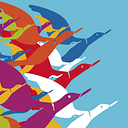Dieva Daba
A Case Study from the GEDS Design Studio 2017. Created by Michael Hazel, A. Johnson, Karlis Kalns & Teresa Pinheiro Ortega
To complete the Gaia Education Design for Sustainability (GEDS) 10-month online programme, our students are invited to join the Design Studio and produce a case study. The aim is to offer students the space to put their acquired knowledge into practice within a global design team composed of fellow students from different countries, to reflect on real world design projects and practice integrative whole systems design by co-designing and creating a detailed project proposal and design. Take a look at the kind of design projects created in previous years here.
Pave your way to becoming a Designer of Integrative Whole Systems by joiningthe Social Design dimension online. It begins on Monday October 23rd. Registrations close 30th October. So sign up now!
Overview
Dieva Daba community is a project born from the certainty that alternative ways of human presence in Earth based on values as respect, trust, collaboration and love, are not only feasible but the answer to the global crisis that our species is facing. A holistic worldview lies at the centre of the community’s beliefs and drives its actions. It is grounded on the interconnection of all life forms that are part of a greater whole, the appreciation of diversity, the acknowledgement that humans are the conscious expression of Nature and, thus, Her stewards. The meaning of Latvian — Dieva Daba is God’s Nature, representing the appreciation and interconnectivity, oneness of humans and nature.
The community will be formed by a group of families, that will settle down in a plot located near the Latvian village Krote, and other members, that will participate in the different projects developed in the community, all of them sharing the same vision, mission and goals. The group will set up the appropriate structures and procedures that support the empowerment and personal development of its members. Decisions will be made following fair, inclusive and operational procedures, including consensus as a major asset for relevant decisions that the whole community can support. Leadership will be distributed among all community members and celebrations will be the glue that connect members with Nature, each other and themselves.
The community is intended to be a model of regenerative culture which can inspire people and communities in the transition towards a peaceful and sustainable lifestyle within the boundaries of our planet. Everyday life aspects in this community are designed to have minimal ecological impact: buildings will be constructed using local natural materials, water and nutrient cycles will be as much as possible closed in the plot, energy will be produced through renewable sources and carbon footprint will be minimal or positive by reforestation, a big percentage of food will be produced on site using agroecological techniques.
Dieva Daba community will be a seed of transformation in its Latvian bioregion, where it will be integrated through several economic projects developed by the community like the creation of a pioneer Educational Centre in Sustainability, the reforestation and regeneration of the region’s landscape and the support of the local economy through the foundation of a Community Supported Agriculture cooperative. As a weaver of a bioregional network, the community will create links with other groups of natural allies and potential opponents, in order to knit a vibrant sustainable social fabric that participates in the transition to a new regenerative culture in Latvia.
Vision
The intentional community is an inspiring model of sustainable life, where people and Nature thrive. It participates in the transition towards a new model of society where love, collaboration, trust and respect for all living beings lie as core values.
Mission & Values
The intentional community works to expand a new paradigm of human presence in Earth, based in the interconnection of all life forms and their mutual support. It promotes and organises Learning Programmes and host people who participate in experiential learning opportunities. The community supports the re-localisation of the bioregion’s economy, knitting networks with neighbouring villages and creating economic opportunities for the local people.
Overarching objectives
- To create a group of 3–5 families, who share the vision of the project and become the core of the community.
- To establish connections with local authorities, local and international institutions and local people that support the project.
- To construct the buildings and infrastructure for the community in an ecologically sound and affordable way for the prospective community members.
- To regenerate the natural environment by increasing biodiversity of wild species through the Commons Forest Trust.
- To develop a Learning Programme based on the 4 dimensions of GEDS. > To create new economic opportunities in the bioregion, which involve local people and support the local production of goods through the CSA Cooperative and organic farmers’ network.
- To make the project visible locally and internationally.
Read the full case study here.
Become a Designer of Integrative Whole Systems. Join the Social Design dimension Case. It begins on Monday October 23rd. Registrations close October 30th. Sign up now!
